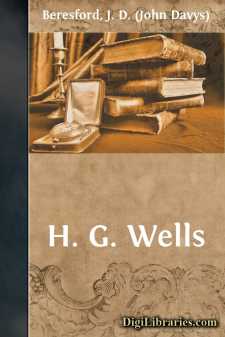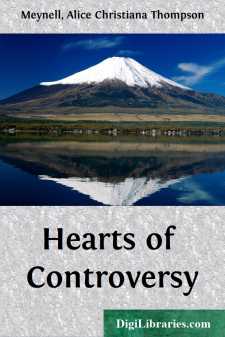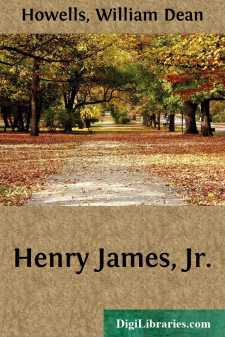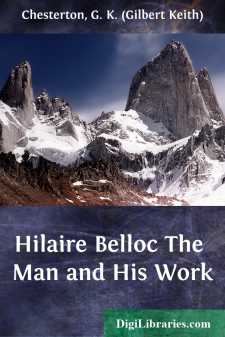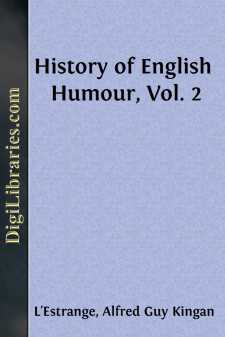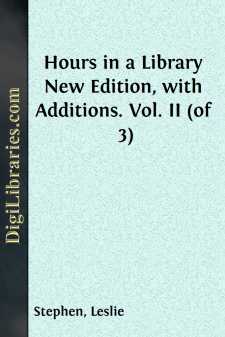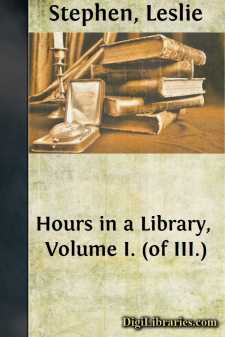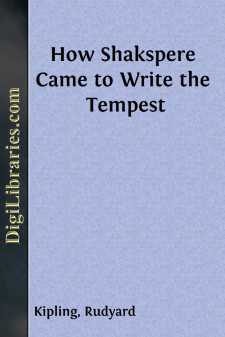Literary Criticism
- American 18
- Ancient and Classical 3
- Asian 1
- Australian & Oceanian 1
- Books & Reading 8
- Caribbean & Latin American 2
- Drama 2
- English, Irish, Scottish, Welsh 49
- European 7
- General 37
- Horror 1
- Humor 2
- Jewish 2
- Medieval 2
- Middle Eastern 3
- Poetry 7
- Renaissance 6
- Russian & Former Soviet Union 1
- Shakespeare 27
Literary Criticism Books
Sort by:
INTRODUCTION THE NORMALITY OF MR WELLS In his Preface to the Unpleasant Plays, Mr Shaw boasts his possession of "normal sight." The adjective is the oculist's, and the application of it is Mr Shaw's, but while the phrase is misleading until it is explained to suit a particular purpose, it has a pleasing adaptability, and I can find none better as a key to the works of Mr H.G. Wells....
more...
SOME THOUGHTS OF A READER OF TENNYSON Fifty years after Tennyson’s birth he was saluted a great poet by that unanimous acclamation which includes mere clamour. Fifty further years, and his centenary was marked by a new detraction. It is sometimes difficult to distinguish the obscure but not unmajestic law of change from the sorry custom of reaction. Change hastes not and rests not, reaction...
more...
The events of Mr. James's life—as we agree to understand events—may be told in a very few words. His race is Irish on his father's side and Scotch on his mother's, to which mingled strains the generalizer may attribute, if he likes, that union of vivid expression and dispassionate analysis which has characterized his work from the first. There are none of those early struggles with...
more...
When I first met Belloc he remarked to the friend who introduced us that he was in low spirits. His low spirits were and are much more uproarious and enlivening than anybody else's high spirits. He talked into the night; and left behind in it a glowing track of good things. When I have said that I mean things that are good, and certainly not merely bons mots, I have said all that can be said in...
more...
INTRODUCTION The earliest history of the Slavic nations is involved in a darkness, which all the investigations of diligent and sagacious modern historians and philologians have not been able to clear up. The analogy between their language and the Sanscrit, seems to indicate their origin from India; but to ascertain the time at which they first entered Europe, is now no longer possible. Probably this...
more...
INTRODUCTION. PART I. ORIGIN OF HUMOUR. Pleasure in Humour—What is Laughter?—Sympathy—First Phases—Gradual Development—Emotional Phase—Laughter of Pleasure—Hostile Laughter—Is there any sense of the Ludicrous in the Lower Animals?—Samson—David—Solomon—Proverbs—Fables. Few of the blessings we enjoy are of greater value than the gift of humour. The pleasure attendant upon it...
more...
CHAPTER I. Burlesque—Parody—The "Splendid Shilling"—Prior—Pope—Ambrose Philips—Parodies of Gray's Elegy—Gay. Burlesque, that is comic imitation, comprises parody and caricature. The latter is a valuable addition to humorous narrative, as we see in the sketches of Gillray, Cruikshank and others. By itself it is not sufficiently suggestive and affords no story or conversation....
more...
by:
Leslie Stephen
A book appeared not long ago of which it was the professed object to give to the modern generation of lazy readers the pith of Boswell's immortal biography. I shall, for sufficient reasons, refrain from discussing the merits of the performance. One remark, indeed, may be made in passing. The circle of readers to whom such a book is welcome must, of necessity, be limited. To the true lovers of...
more...
by:
Leslie Stephen
OPINIONS OF AUTHORS Libraries are as the shrines where all the relics of the ancient saints, full of true virtue, and that without delusion or imposture, are preserved and reposed.—Bacon, Advancement of Learning. We visit at the shrine, drink in some measure of the inspiration, and cannot easily breathe in other air less pure, accustomed to immortal fruits.—Hazlitt's Plain Speaker. What a...
more...
by:
Rudyard Kipling
INTRODUCTION Mr. Kipling’s brilliant reconstruction of the genesis of the ‘Tempest’ may remind us how often that play has excited the creative fancy of its readers. It has given rise to many imitations, adaptations, and sequels. Fletcher copied its storm, its desert island, and its woman who had never seen a man. Suckling borrowed its spirits. Davenant and Dryden added a man who had never seen a...
more...


